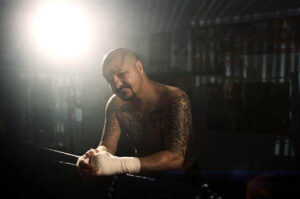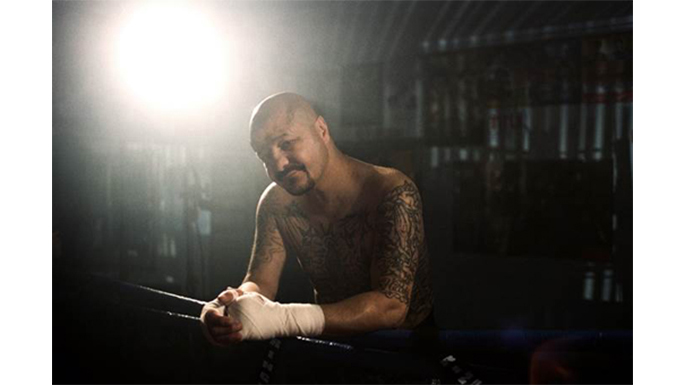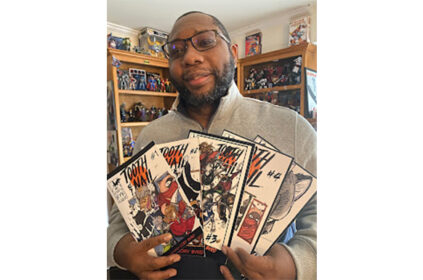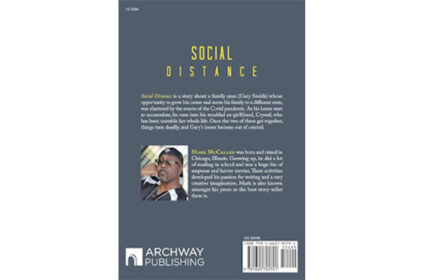Interviewed and written by Tocarrra Eldridge
 Riveting, heartfelt and stimulating are just a few of the words that describe one of the most poignant films of the century, TAPIA The Documentary. The rights to this touching story belong to Lou DiBella, sports promoter, tv/film producer, and close friend of Johnny Tapia, as well as entertainment guru Curtis “50 Cent” Jackson. TAPIA takes viewers inside the turbulent life and times of the late boxing world champion Johnny Tapia. However, this documentary is far more than a boxing film; it’s a story of love, loss and determination. It’s about life, tragedy, triumph of the human spirit and redemption, in which anyone who has experienced the roller-coaster of life will definitely relate to. The documentary reveals the emotional torture and anguish that Tapia suffered throughout his life. It also demonstrates that no matter how tough life’s trials are, and no matter how many mistakes are made, one must never give up and continue to fight toward living a flourishing life.
Riveting, heartfelt and stimulating are just a few of the words that describe one of the most poignant films of the century, TAPIA The Documentary. The rights to this touching story belong to Lou DiBella, sports promoter, tv/film producer, and close friend of Johnny Tapia, as well as entertainment guru Curtis “50 Cent” Jackson. TAPIA takes viewers inside the turbulent life and times of the late boxing world champion Johnny Tapia. However, this documentary is far more than a boxing film; it’s a story of love, loss and determination. It’s about life, tragedy, triumph of the human spirit and redemption, in which anyone who has experienced the roller-coaster of life will definitely relate to. The documentary reveals the emotional torture and anguish that Tapia suffered throughout his life. It also demonstrates that no matter how tough life’s trials are, and no matter how many mistakes are made, one must never give up and continue to fight toward living a flourishing life.
Dibella, who was side by side with Tapia while filming this must-see documentary, shares with us [Consciousness Magazine] personal insight regarding TAPIA The Documentary…Johnny Tapia’s last gift to the world. Here is what close friend of Tapia had to say.
Tocarra Eldridge: You and Curtis “50 Cent” Jackson acquire the rights to the documentary TAPIA. How has the experience been working with him?
Lou DiBella: I’ve worked with 50 before. We promoted some boxing stuff together. He’s really one of the more creative, interesting and brightest guys I’ve worked with. He’s a really good person to work with. This documentary was brought to my attention; as soon as I saw it, I wanted 50 to see it. Literally, we sat there together and watched the first ten minutes of it, and it hit home for him. He [50] lost his mother under tragic circumstances, and watching the enactment of Johnny’s mother’s death connected with 50. We both found the documentary really riveting. We worked out a deal with the filmmaker Eddie Alcazar. Like I said, 50 is a great guy to work with. He’s a no nonsense guy; what you see is what you get. He’s very professional and he is a super smart and creative guy. I’m impressed by his creativity and ability to market products. He has a tremendous following. Having his name attached to a project like this brings this project to the eyes of countless people who otherwise would not get the opportunity.
TE: What are some of the things that you learned from Johnny Tapia, since working on this film?
LD: Well, I knew Johnny Tapia. I used to run a boxing program on HBO. I put together one of the biggest fights of Johnny’s career with a guy named Danny Romero. That was a fight between two young guys who were both superstars. It was one of the biggest fights in boxing at the time. Johnny was most excited about it. He was in the rankings…all heart, blood, guts, giving 110%. Johnny had a lot of demons. He had to be revived a number of times; he literally died on the table. He struggled with the fact that his mother was brutally murdered and for years and years he never knew who did it. Only years and years after the murderer was dead did Johnny learn who actually committed the murder. He also had a tremendous love story with his wife Teresa. She was his rock. He would always say without her he doesn’t think he would have survived. Unfortunately, only a matter of weeks after the documentary was completed, Johnny died unexpectedly of heart failure, natural causes. [It was] probably resulting from the stresses that Johnny had put on his body over the course of his life and the addictions that he suffered through. He died of natural causes during a time where he was more at peace. Ironically, he died before the anniversary of his mother’s murder.
TE: In regards to the documentary, what are some intriguing things that are touched upon concerning the late great boxer?
LD: It’s not really a boxing documentary; it’s about life, tragedy, triumph, failure and redemption. This story will appeal to all people. It’s a movie for anyone that’s experienced the roller-coaster of life, the ups and downs of life…for those who get knocked down and get back up again. It’s a great, powerful, human interest documentary. The story in one sense didn’t have a happy ending, but in another sense it did, because what Johnny’s life was about represented the triumph for the human spirit. No matter how many times you’re knocked down, no matter how many times the demons get possession of you, you have to keep fighting on to make a life and survive, live and be happy. One of the last things that Johnny said in an interview was that for all the tragedies, for all the struggles, for all the battles with addiction, for all the nightmares that he had about his mom’s death, for all his demons, he looked back in his life and said he had a good life. ‘I’ve still been a 5x champion. I’ve still had the love and respect of people. I’ve still had a good life.’ I think that’s what is to be taken from Johnny Tapia’s heart. In essence, redemption is never out of the question; we all have a chance no matter what mistakes we’ve made.
TE: As a promoter, do you feel as though you have had similar life situations as Johnny Tapia?
LD: As a human being, as a person, I have my ups and downs. I think that no matter what happens in your life, you still always have a chance to get up, dust yourself off and still chase your dreams. When you stop trying there’s nothing left. I think I can relate to Johnny. I think with the strength of this movie, I don’t think there’s a single human being walking around that can’t relate to Johnny or to the story. Most of us have not experienced the same trials and tribulations as Johnny, and may not have experienced a lot of what he had experienced. But every one of us has experienced being knocked down and having to get back up, and feeling hopeless and then realizing that the only way to live your life and be happy is to regain some measure of hope and move forward and go after what it is you really want. In some sense I feel like this movie was Johnny’s last gift to the world – a gift that he not only left his fans and the people that loved him, but also a gift that he left those who love film and movies and stories with triumph of the human spirit.
TE: Acquiring a piece of history, what type of impact do you believe this film will have on viewers?
LD: In the movie, Johnny had a real mission in his life; he talks about kids staying away from drugs. ‘The first time you do it it’s a mistake; the second time you do it it’s a habit.’ I think that it’s a message here saying no matter how hard things are in your life, no matter how much life knocks you down, don’t be self-destructive. Don’t make the same mistakes I made! I think that’s the message he was trying to give, and also the message Never Give Up. No matter how weak things look, no matter how much you hurt, no matter how bad the hand you’re dealt is…Never give up!
TE: Would you like to add anything else before we close the interview?
LD: This is much more than a boxing movie. It really isn’t a boxing film. It has much more to do with the affect the loss of Johnny’s mother had on him, the demons that he had to face in his life that were created by the trials he experienced, the relationship that he had with his wife and how much that helped him live, move on and keep trying. It’s a story about the roller-coaster that life can be and the triumphs of the human spirit.
For more information about Lou DiBella visit http://www.dbe1.com
Photos by: Matthias Königswieser
Last modified: May 15, 2023



















